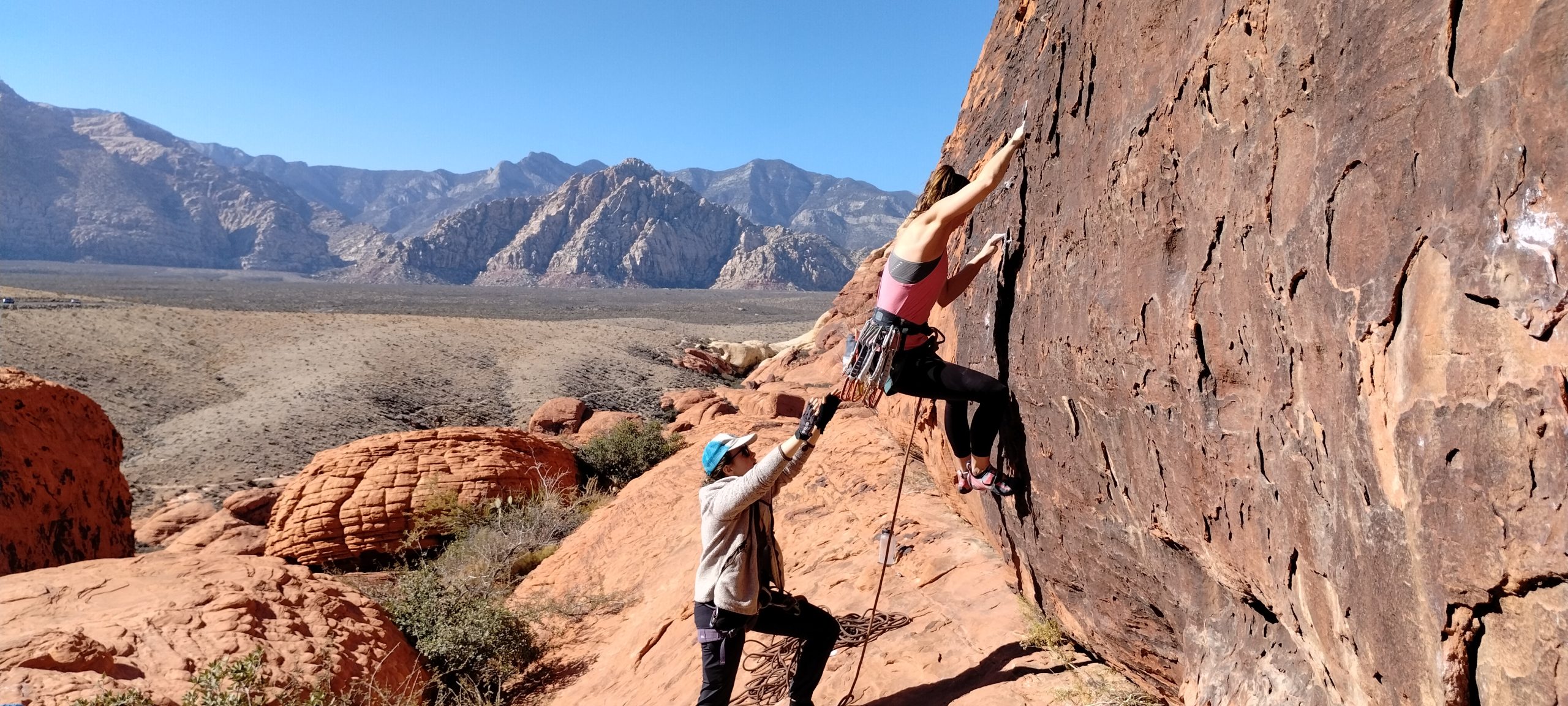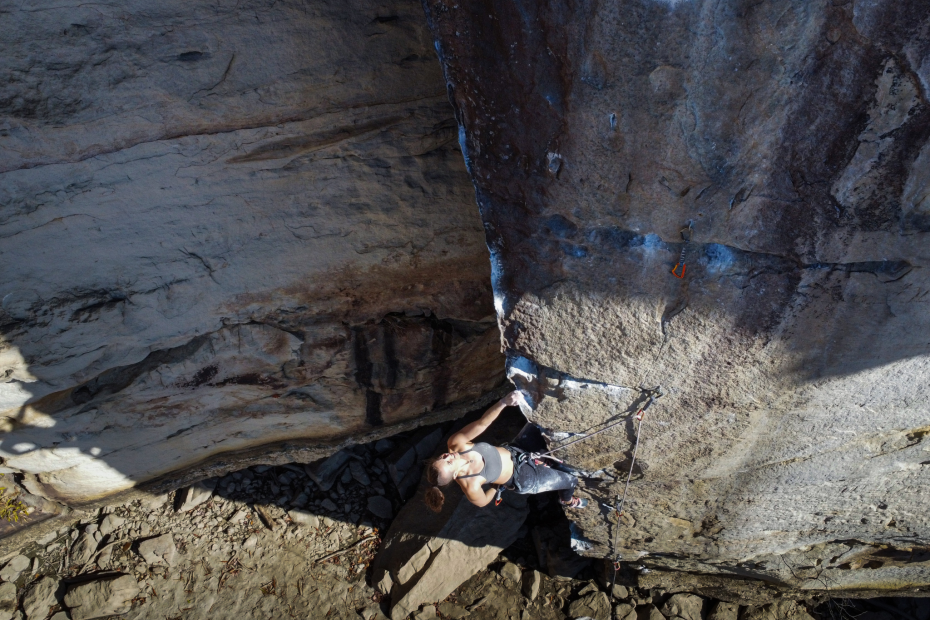This post is not going to be about me. Cheering from the crowd. Seriously though, I want to write about mentors. In the current climate of climbing training, I don’t think mentors are thought about or spoken about much at all. But by and large, mentorship is the biggest and most important growth factor in climbing that I can see. Let me explain.
A quick Google search gives the following definition of the word mentor: “an experienced and trusted adviser”. But read on, and the synonyms paint a far richer – and more accurate – picture: advisor, guide, confidant, counselor, consultant. I think the real role of a mentor is somewhat hard to define because it’s kind of everything.

A good mentor will teach you all of the climbing things, yes, but they’ll also be privy to the rest of your life. I’ve said this before and I’ll say it again: we’re all still people at the end of the day. We don’t tie in and ascend rock faces sans the bits that make us human. And those bits are enormously important.
A mentor will believe in you on a very fundamental level. I’d say that’s one of their most critical roles: to keep you keeping on when times get tough, when you have setbacks, when your belief lapses. Sometimes, that’s through affirmation and encouragement. Other times, it’s via tough love. A mentor tells you when to suck it up, buttercup. Not even the biggest boulder bro could blame it on skin when the person they respect the most says otherwise.
That was a lot of intangibles, I know, so I’m going to try and get into the more logical reasons why mentorship is the tits.
Mentorship first, training second
Fair warning: this is going to get a bit Inception-y. In my opinion, the macro view of your climbing is the most important bit. You can spend hundreds of hours toiling away on finger strength in the gym, but if that’s not actually your limiting factor, you’re not spending your time very wisely. This is a very simple example, but the logic applies more broadly. Training is great – I’m not arguing against that. But what you train is key. And mentors help you identify the things you really need to work on, as opposed to the things that you want to work on.
Finger strength and pulling power are very popular. And they’re definitely important. But there are other important things too: footwork, coordination, tension… breathing, reading beta, the ability to relax. There are thousands of factors. Somebody more experienced can often see what you’re missing and point you in the right direction, so you can train those things and get the most value out of your time. See why I’m saying it’s so important?

Standing on the shoulders of giants
If you haven’t heard this expression before, it was popularized by Isaac Newton. He said, “if I have seen further [than others], it is by standing on the shoulders of giants”. Basically, you don’t need to reinvent the wheel. It’s far more efficient to learn about wheels from wheel experts than it is to start from scratch on your own. Now apply that to climbing.
This concept is honestly kind of like the internet. We live in the “information age”, where there’s so much accessible with just a twiddle of the fingers. If you want to build out a van, you Google it. You watch YouTube videos. You ask your mate who built theirs last year. You don’t buy a van and just wing it. So why would you do that in climbing?
The experience of other people is insanely valuable. Think about something that you’re good at – it doesn’t have to be climbing. Then think about when you started doing that thing. There’s probably a huge information and experience gap there. That’s something that, in large part, can be transferred from person to person. When you start a new job, for instance, you typically receive training for the role. You know what I’m going to say next.
So why aren’t mentors all over Instagram?
In short, because there are too many new climbers vs old climbers. The explosion of our sport has kind of messed up the ratio. But that doesn’t mean that you can’t have a mentor – it’s just maybe not the status quo it used to be. It’s a relationship that both parties have to invest in: the mentor is going to invest time and energy (I would argue that emotional energy is probably the biggest factor), and the mentee is going to invest trust… If you’re going to spend your time doing what somebody else suggests you do instead of what you want to do, you’d best believe you’re going to trust that person.
Before climbing gyms, mentorship was the way to start climbing. And while gyms have lowered the bar to entry – making climbing more accessible – and increased our ability to practice our sport, they’ve also been a part of this loss. You rarely meet somebody in their 20s who learned how to climb outside – let alone on gear. Today’s younger climbers are almost all gym-raised. Mentors do still exist, though, you just have to find them.
And mentorship doesn’t have to be altruistic. The aforementioned explosion of our sport has also created a wealth of climbing coaches, and a good coach is absolutely a mentor too. Are you paying for a coach? Yes. But that doesn’t mean that their investment in you is any less meaningful. If you compare that to a romantic relationship – where one partner is mentoring the other – or a friendship, the mentor is still receiving something in return. It’s just quantified differently. I’ve had a number of climbing mentors – some of whom I paid, some of whom I didn’t. I don’t think that any one of them was more or less invested in me.
A few years ago, when I was still very scared, I attended an online fear of falling masterclass with Hazel Findlay. She hosted a Q&A session at the end of the class, and I asked her a question about my (fearful) situation. I’ll spare you the details, but her response was this: “I think you need a mentor”. And she was right.

Being a mentee and a mentor
More recently, I’ve found myself sometimes in the position of mentor. This blog has helped me understand my own information and experience gap: the whole point of it is to share the things that I’ve learned. So I started sharing them in real life too, mostly with my sister, who is an experienced trad and multi-pitch climber but a less experienced sport climber (relative to me).
Even from this perspective, I think my most important role was fundamentally believing in her. I told her that she could do it, just as somebody told me. I taught her how to redefine failure, just as somebody taught me. I showed her how to tape her fingers, I logic-ed away her tears, and I described beta in minute detail. I gave many marathon belays. It felt good to be paying it forward.
People always talk about relationships as being the most important part of climbing – about being a part of the community. I honestly used to despise this sentiment. In the beginning, (male) climbers sprayed me down with unsolicited beta, hit on me at the gym, and congratulated me when I flashed V0 but not when I flashed V3. They stopped trying anything hard-for-them if I got on it. They loudly exclaimed how soft a climb was after I sent it. They told me that the thing I thought was scary was, in fact, not.
It’s very hard to put into words how these things made me feel. In short: unwelcome. The climbing community wasn’t my community. It was just something to tolerate in this new sport that I loved. But then I started to find my people. They didn’t have egos, and they did get scared. But they also climbed hard, got on bold routes, and respected me – regardless of how hard I climbed. I like to think that I am that, and that I can be more of that, for other people. I try hard to be vulnerable and honest on the internet. I don’t want to just talk about my hardest sends and biggest successes: I want to talk about the (many) things I suck at.
I encourage you, if you’re reading this, to find your people. And if you’ve already found them, tell them how much you value their input. Mentorship doesn’t have to come in a defined package: you can get a little bit here and a little bit there. And there are plenty of great people out there. I love my community now: the people in my climbing life are super important to me. I also encourage you to be that person for somebody else. How I felt when I sent my first 5.12 was very similar to how I felt when my sister sent her first 5.12. And that’s pretty fucking cool. We call climbing a “selfish” sport, but I don’t think it is – or at least, it doesn’t have to be. That’s entirely up to you.

A huge thanks to my mentors, past and present, some of whom are listed below:
- Ben Phipps, who believed in me from the start.
- Felipe Solanilla, who took me out as a sport climbing weenie and told me that I was going to be better than him (I laughed).
- Ryman Wiemann, who was hugely responsible for helping me jump from 10a to 12b in one year.
- Karly Rager, who knew that I could be brave long before I did and gave me the tools to get there.
- Jesse Firestone, who is always willing to talk about anything, never raises an eyebrow at my goals, and fastidiously programs things to help me achieve them.
Featured image credit: Sebastian Stewart
